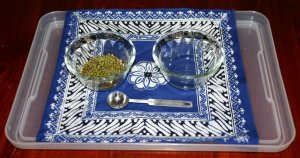
Montessori educational activities can be categorized into 5 areas:
- Practical life – personal and social skills used in daily living; care of self and environment, courtesy & etiquette etc.
- Sensorial – developing the child’s sense perceptions of the world and using their senses to learn.
- Language – reading, writing, spelling etc.
- Mathematics – counting, arithmetic etc.
- Culture – physical science, history, geography, biology etc.
These activities or experiences are presented via a ‘prepared environment’ with each new task building upon the principles of the earlier ones and promoting work habits that lead to success in later academic work. The activities are designed to be self-teaching and promote independent learning. The materials are child sized and the equipment is presented in an orderly manner on accessible shelving, with a focus on choosing materials that are aesthetically pleasing.
While I do not necessarily follow the Montessori philosophy, the Montessori materials are brilliant and I have based a lot of my early homeschool education around activities that come either directly from the Montessori approach or are inspired by Montessori ideas.
I have organised them under the categories of “Practical Life”, “Language”, “Mathematics” and “Other” which include the following types of activities:
Practical Life (starting out with toddlers here)
1 to 1 correspondence (examples here)
Fine motor (including toothpick activities, threading and sewing)
Cutting (teaching toddlers to cut)
Gluing (preschool example here)
Logic & patterning
Matching activities
Miscellaneous – magnets
Nesting & stacking
Opening & closing
Pegging & clipping
Posting (ball posting, jar of spoons, posting bottles, tissue box posting)
Small spaces
Sorting & colour matching (intro activities, 5 category sorting, more sorting)
Transfer activities using tongs, spoons, scoops, ladles etc. and a variety of wet and dry materials (mega marbles, giant beads, water transfer, water pouring tea set)
Storage & organisation
Language
Reading
Writing
Spelling & phonics
Other
Mathematics
Number: including 1-to-1 correspondence, counting, numeral recognition & order, addition, subtraction, multiplication and division etc.
Shape
Measurement (Length comparison)
Sorting (intro activities, 5 category sorting, more sorting)
Other
Other
My workjobs are organised into the same four categories as they are so closely related to the Montessori style activities. See here for more information on workjobs.
Materials, storage and organisation
Some ideas here


Leave a comment